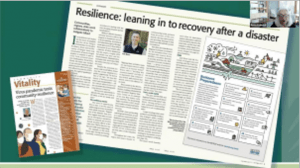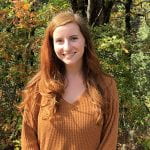By Ruby Barrera, Community Engagement Specialist, Maxville Heritage Interpretive Center
Growing up in a rural place I felt TRAPPED, and the opportunity to leave wasn’t coming soon enough. It’s a tale as old as time: grow up rural, feel like your potential isn’t being met, move to the city, and become ultra rich and successful like in the movies. Yet, when I did get out to the city, I started realizing how much I loved aspects of my rural community. Knowing your neighbors, volunteering, walking to the grocery store all become less important in the hustle and bustle of the city. In that chaos though, community—I realized—is truly what was imp ortant to me. Deep down, I was still a rural small-town girl who just needed some time to widen her world by living in a place completely different from where she grew up.
ortant to me. Deep down, I was still a rural small-town girl who just needed some time to widen her world by living in a place completely different from where she grew up.
Rural development: that was the phrase that just made everything click for me. Why didn’t I realize, rural development was what I was always incorporating into my school work? Truly, who takes a business innovation class and makes a presentation on the innovation of milking parlors? Me! Yes, I was influenced by my first job at a sustainable agriculture and energy museum. However, agriculture wasn’t even what I was passionate about. I’m passionate about the PEOPLE who work in agriculture. So, I started realizing that I need to get back to working and serving rural to truly see if my passion just might lead me to this broad term of rural development. Queue me discovering the AmeriCorps RARE program and within three months, I was packed and moved to isolated Wallowa County. Thankfully, I came to serve in a placement that directly works in diversity, equity, and belonging. Which felt special as I was entering a new community on my own.
 Maxville Heritage Interpretive Center is truly one-of-a-kind, reviving a 240-acre ghost town while acknowledging and sharing Oregon’s history of exclusionary laws, diversity, arts, music, family heritage, and even trauma and healing. The work we do truly speaks to my personal passions in several ways.
Maxville Heritage Interpretive Center is truly one-of-a-kind, reviving a 240-acre ghost town while acknowledging and sharing Oregon’s history of exclusionary laws, diversity, arts, music, family heritage, and even trauma and healing. The work we do truly speaks to my personal passions in several ways.
It was not only exciting but somewhat comforting to know I’d be landing in a work space that recognizes and welcomes my identity as a brown-Latina woman. Which was important, as I was entering a community that has little to no individuals who share my culture, age, or skin-tone. Yet, working for a Black-women led organization feels transformative for me. Someway, somehow, the stars aligned in my favor. The work I do with MHIC is truly breaking stereotypes that are often perceived with rural places.
In my service year with RARE, I’ve had to expand what my definition of rural even is. Living and working in a frontier community is really not for the weak. Yet, the same reason why I loved my hometown and the community we have there, is exactly why I love my placement. The people make it special…and the beautiful scenery isn’t too bad of a perk. I’ve had the opportunity to be exposed to nature, arts, dance, writing, history and music in my daily life that inspires me and my work. Exposure to a new community has given me a fresh perspective, for how people create solutions to their rural barriers and how those same ideas could be shared and championed in other communities. It’s inspiring to see a place that cares deeply for its community members and motivates you to contribute to this goal, however you can. I’ve been captivated by the culture of Wallowa County. I’m grateful for the opportunity to be able to expand my way of thinking through experiences like this.
 About the author, Ruby Barrera (she/her/ella): Ruby graduated from the University of Portland, where she earned her B.B.A. in Marketing and Sociology. She is a proud daughter of immigrants who settled in rural Eastern Oregon. Growing up in Eastern Oregon has greatly influenced her passion for rural development, community engagement, and diversity, equity, and inclusion work. In addition to being eager to learn and expand her current skillset, she is prepared to experience the diversity—and challenges—of a new rural community. Ruby is excited to serve Wallowa county!
About the author, Ruby Barrera (she/her/ella): Ruby graduated from the University of Portland, where she earned her B.B.A. in Marketing and Sociology. She is a proud daughter of immigrants who settled in rural Eastern Oregon. Growing up in Eastern Oregon has greatly influenced her passion for rural development, community engagement, and diversity, equity, and inclusion work. In addition to being eager to learn and expand her current skillset, she is prepared to experience the diversity—and challenges—of a new rural community. Ruby is excited to serve Wallowa county!
Interested in gaining sustainability and environmental planning experience of your own? Are you looking for a life changing experience in rural Oregon? Learn more about serving with the RARE AmeriCorps Program. Applications for Year 31 (2024-25) due April 28, 2024 by 11:59pm PDT.



